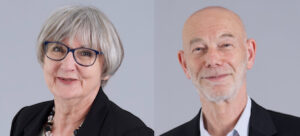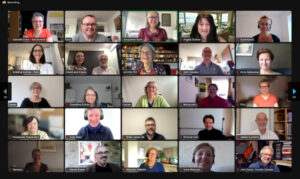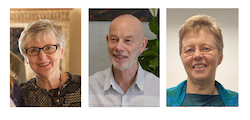Published in NZAC Counselling Today, June 2008

David John Grove
(1950-2008)
died suddenly in Kansas City, USA, aged 57.
Born in Tauranga, of Maori and European descent, David took inspiration from his whakapapa and ancestral teaching.
He graduated from the New Zealand Universities of Canterbury and Otago before taking a Masters in Counselling Psychology at the State University of Minnesota. David served as a consulting psychologist with the London Phobic Trust, and published a book with Basil Panzer called Resolving Traumatic Memories (1989, Irvington).
His avant-garde approach took in learning from all aspects of life: systems theory, physics, literature, ancient Greece, aviation and the web. He was able to synthesise these ideas into his work and emerge with spectacular new processes.
A brief resume of some of David’s early work follows: In 1986 he presented a keynote address at The International Symposium for Psychotherapists in London . He spoke at the American Association for the Study of Mental Imagery at the Medical College of Wisconsin with R.D. Laing and Isaac Marks. Other engagements included speaking at the London Society for Ericksonian Psychotherapy and Hypnosis, The Vietnam Veteran Administration, Augusta, Georgia, at conferences held by Virginia Satir, founder of the Mental Research Institute for Brief and Family Therapies in Palo Alto California, working closely with Caril Lankton, Bill O’Hanlon, Dr Brian Roet and Charles Whitfield, author of Healing the Child Within and Memory and Abuse.
David was great friends with the playwright and author Willy Russell, author of Shirley Valentine and toured with other productions of Russell’s work – ‘Words on the Run’ and ‘ The Wellingborough Bootleg’.
The accepted methods of treating trauma 25 years ago were to encourage patients to ‘desensitise’ by talking through their experiences; David, however, noticed that this often re-traumatised patients and instead listened to them describe their symptoms spontaneously in metaphor, for instance ‘it feels like a ton of bricks’, and found that exploring these metaphors alleviated their disorders.
To encourage this process, he repeated patients’ own exact words back to them and developed a series of simple questions which would carry the least possible influence from the therapist. Because this honoured the patient’s experience, ideas and values without contaminating them with those of the therapist, he named this technique ‘Clean Language’.
His work stood on the shoulders of Jung’s in its use of symbols but a key difference was David’s discovery that the metaphor does not require interpretation, only exploration until it reaches a place of peace. Then the subject will find that phobias, internal struggles and limiting behaviour patterns of years have disentangled and become integrated with the whole person.
David further developed his work spatially into ‘Clean Space’ and ‘Emergent Knowledge’, where he applied the principles of the science of emergence to the human psyche.
David’s work also sustained its popularity following the establishment of the False Memory Syndrome Foundation. Therapists who had been in pursuit of uncovering early memories of childhood abuse found themselves accused of progenerating the memories. Because his work was not to discover memory but rather to provide symptom relief, it left him clear of the enormous dispute that rocked psychotherapy at the time.
David had little interest in making a name for himself or even in making a living, but was entirely focused on developing healing processes. With complete disregard to his own health, he lived a peripatetic existence delivering hundreds of workshops, seminars and personal healing retreats to over 40,000 people in the U.S., France, Holland, England, Ireland, Australia and New Zealand.
How fortunate those of us were to have attended David’s trainings here in New Zealand and especially to have attended his healing retreats on his ancestral Marae, ‘Waipapa’ in Kawhia.
In latter years he amassed a variety of equipment, like a 7 foot tall fairground whirligig in which he could further his cutting edge spatial experiments by turning people upside down and in all directions in between; this was towed behind him from one end of the UK to the other and was last seen in France. Workshops were always unpredictable because his insatiable curiosity took the lead over any advertised programme, but the results were invariably precise, original and spellbinding.
Psychotherapist Ernest Rossi said of him:
A gentle genie has escaped from the lamp. His name is David Grove and his magic Clean Language.
While being sternly dedicated to his work, David could indeed be a mischievous magician and was held in profound and indulgent affection by all who knew him because the gentle genie showed up in all sorts of kind gestures, like the infinite, painstaking, psychological help that was on offer to all comers, a shop for the soul that never closed.
At his funeral, therapist and co author of Metaphors in Mind, James Lawley, posed the question:
And answered:
If greatness is determined by the number of stories told about you, then David Grove, you were a great man.
If greatness is determined by creativity and inventiveness, then David Grove, you were a great man.
If greatness is determined by the number of people whose lives are touched and in whose memories you reside, then David Grove, you were a great man.
If greatness is determined by generosity of spirit and the amount of knowledge given away, then David Grove, you were a great man.
If greatness is determined by compassion for the pain and suffering the human spirit can endure, then David Grove, you were a great man.
If greatness is determined by one’s optimism and expectation that people can heal and transform their lives, then David Grove, you were a great man.
And, if greatness is determined by taking the path never travelled before with courage and dignity knowing there is a price to pay to yourself and to your loved ones, then David Grove … you were truly a great man.
The affection and regard with which David was held by those he reached are clear from many tributes posted on the cleanforum [Link no longer available].
David Grove, 1950-2008, was buried at Pyes Pa Cemetery. He leaves behind his parents, a brother and two sisters. David was predeceased by a sister.
Dafanie Goldsmith,
Psychotherapist MNZAC








